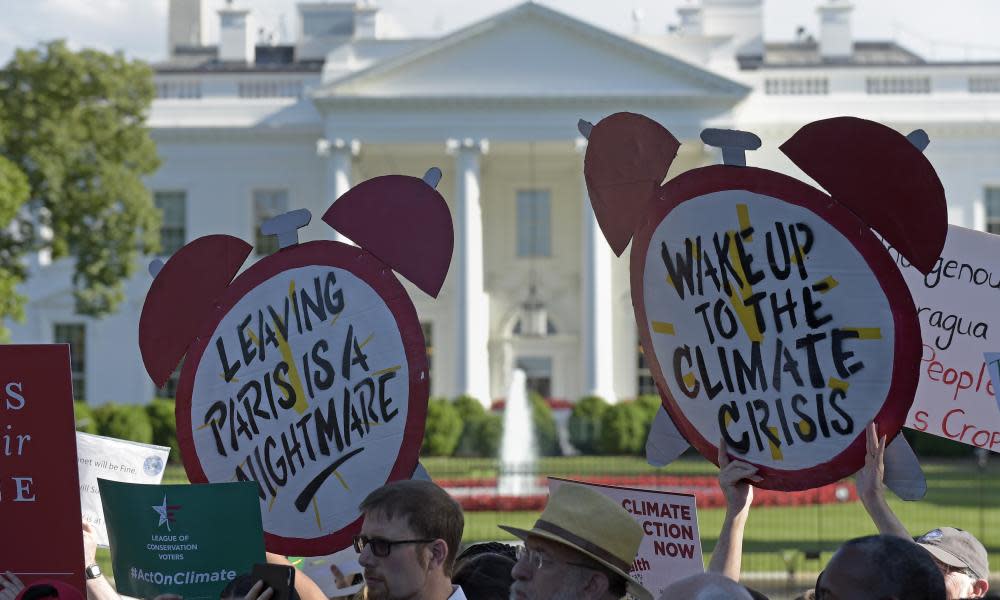Eco startups in Trump's America: 'Fake news could hit investment'

Following the decision made by president Donald Trump to pull the US out of the Paris climate agreement, entrepreneurs working in the renewable energy (such as solar and wind power) and sustainability sector vow to carry on despite fears his actions could hit investment.
Dawn Dzurilla, the founder of Gaia Human Capital Consultants, a San Francisco-based firm speclialising in executive recruitment in the sector – also known as cleantech – says that while business leaders are determined to continue decarbonising their operations and investing in renewables, there are concerns that Trump is undermining confidence.
“From senior executives, right down to our brilliant young people, there’s concern that disappearing from the Paris climate change agreement will impede this entire industry,” she says. “Fake news could impact the investment into the space. We have certainly seen a lot of misinformation about the climate.”
Dzurilla also emphasises that renewables make financial sense. “It’s about green, both on the earth and in our pockets,” she says.
Lisa Ann Pinkerton is the founder of Women in Cleantech and Sustainability, a networking group for female entrepreneurs and business leaders working in the sector. She also runs Technica Communications, a PR firm with clients in the cleantech space. Pinkerton says neither her members nor her clients were surprised by the president’s decision, but says few entrepreneurs are likely to change their plans as a result.
“The earliest America can pull out of the Paris accords is 2020, so we’re still going to be a part of it until then,” Pinkerton says. “You don’t just pull out of these things, you have to renegotiate. So there’s a lot of hype and rhetoric, and playing to the base.”
She adds that businesses have a financial incentive to invest in renewable energy. In California, companies have to pay more for energy during peak periods. This is prompting the likes of Google and Facebook to use solar power to run their organisations. The state obtains around 27% of its electricity from renewables, according to the California Energy Commission, which is almost twice as much as the US as a whole, and aims to receive all its power from renewable energy by 2045.
“Why are the new data centres running on solar? Because it makes financial sense; they are saving a ton of money,” Pinkerton says. “So entrepreneurs are watching this space and looking for opportunities.”
The nation's thinkers entrepreneurs and citizens are now inspired to greater action in their pursuit of a clean economy
Udi Merhav
Energy storage is a crucial part of renewable energy adoption, as it enables power generated at peak times – strong winds or bright sunshine – to be used at other times. One US company in this sector is Simpliphi Power, based in Ojai, California. Its CEO, Catherine Von Burg, says economics is the best antidote to Trump’s rhetoric.
“Despite Trump pulling out of the Paris agreement, the economics of cheaper fuel sources, that happen to be renewable, will drive the market forward,” Von Burg says. “Then, the bipartisan rhetoric about climate change being real or not won’t matter. The bottom line, and the return on investment, will create the change the planet needs at this critical juncture in time.”
Entrepreneurs are working with big utilities companies that were previously huge investors in fossil fuels, but who now want to decarbonise their operations. Among them is Udi Merhav, founder and CEO of EnergyOrbit, which has created cloud-based software for utilities companies that helps them automate energy efficiency programmes and grid management. EnergyOrbit has clients across North America and says these companies are unlikely to change their plans in a hurry.
“Fortunately, our customers are utilities with 25-year time horizons,” Merhav says. “Reversing course based on the preferences of one political party or another does not serve their long-term planning.”
He also points to the growing number of US states and major companies and organisations opposing Trump and suggests the president may be unwittingly galvanising the opposition. Companies such as Apple, Microsoft and Facebook have made public statements rejecting the pullout and 12 US states have decided to uphold the Paris climate agreement regardless of the White House’s position.
“In the wake of the administration’s withdrawal from the Paris accords, the nation’s leading thinkers, entrepreneurs and average citizens are finding themselves inspired to greater action in their pursuit of achieving a clean economy,” says Merhav.
Amrit Chandan, the co-founder of Aceleron, travelled to California this month with other UK cleantech startups on a trade mission backed by government agency Innovate UK, to meet Silicon Valley investors. He found his business, which remanufactures old lithium ion batteries and turns them into energy storage packs, attracted a lot of interest from investors.
“Many people in California seem to have become galvanised in their opposition to Trump,” he says. “There’s a sense in California that they are going to do it for themselves.”
Sign up to become a member of the Guardian Small Business Network here for more advice, insight and best practice direct to your inbox.

 Yahoo News
Yahoo News 
